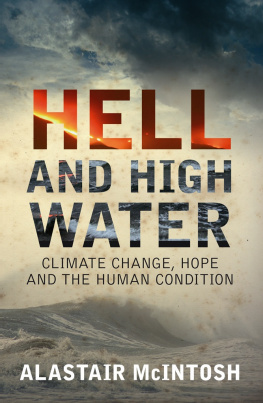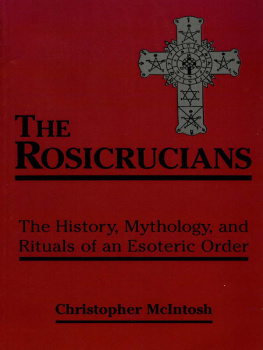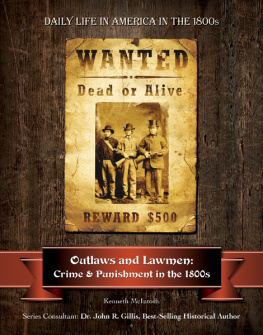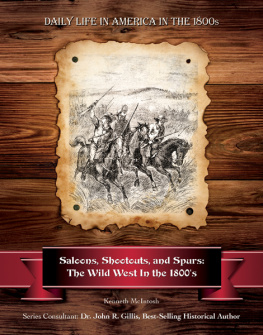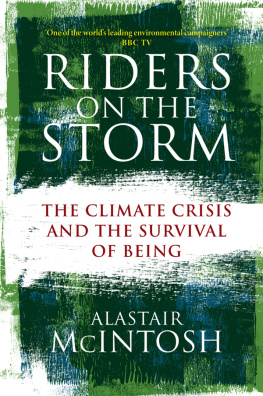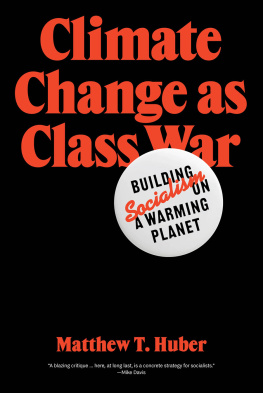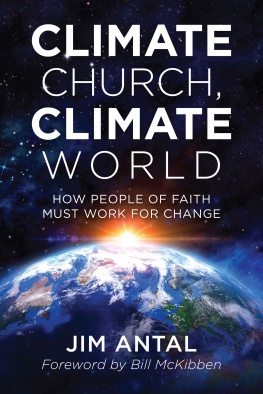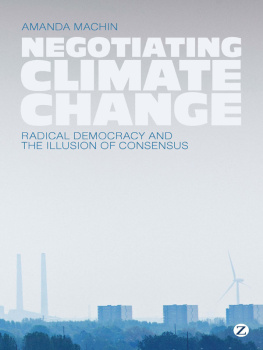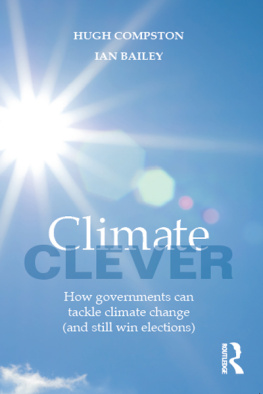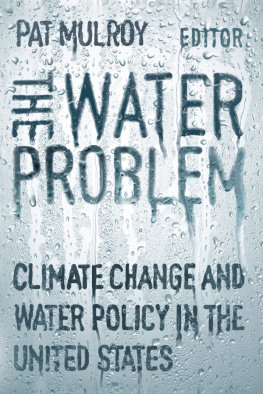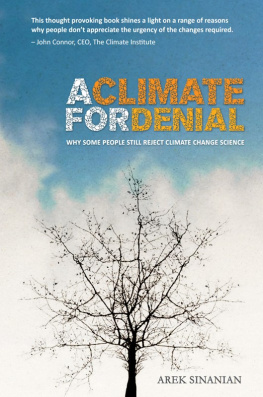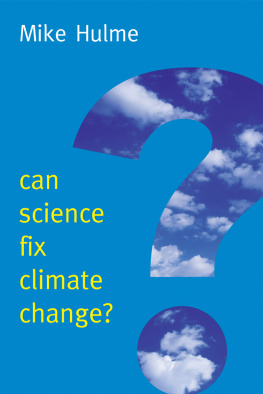Alastair McIntosh is a Scottish writer and campaigner for social justice and environmental sustainability. He holds fellowships at the Centre for Human Ecology, the E. F. Schumacher Society and the Academy of Irish Cultural Heritages at the University of Ulster. In 2005 the University of Strathclyde gave him an honorary post as Scotlands first professor of human ecology. He guest lectures around the world at institutions including the Russian Academy of Sciences, the World Council of Churches, WWF International in their One Planet Leaders programme and, for the past decade, speaking about nonviolence on the Advanced Command and Staff Course at Britains foremost military staff college.
Praise for Hell and High Water
Provides a chilling clarity... McIntoshs excellent expos might just clear a path out of the darkness Paperback of the Week, The Herald
A concise and concerning summary of the current thinking on the science of climate change... eloquent and bewitching Institute of Environmental Management, The Environmentalist
Thoughtful, incisive and emotionally powerful Duncan McLaren, Friends of the Earth
He is at the forefront of an increasingly important exploration of hope in an apparently hopeless ecological situation Michael Fordham, Huck Magazine
A valuable insight... a fantastically unlikely combination of insights John-Paul Flintoff, TimesOnline.com
Whats really significant about this book, politically, is that McIntosh has made green living sound attractive... He takes a step back from the problem and looks at the causes behind the causes... Of genuine international importance Roger Cox, Scotsman
He explores the deep order conditions of hope for our planet in the midst of the crisis of global warming. There is no room for a shallow optimism in our present predicament. Hope is a virtue of a different order of magnitude... A deep cultural pathology demands a deep cultural psychotherapy Professor Emeritus Edmund OSullivan, Resurgence
Among climate change books, Hell and High Water is in a class of its own. I know of no one else who has to date presented such a holistic perspective on our collective challenge Peter Vido, www.ScytheConnection.com
Its odd that a book of such bright hope should be based on such practical despondency. But then, this lies at the core of his message. He is saying that only when you have stared into that dark place can you find a hope that is real... McIntosh offers a soul-based solution Vikky Allan, Sunday Herald

This eBook edition published in 2012 by
Birlinn Limited
West Newington House
Newington Road
Edinburgh
EH9 1QS
www.birlinn.co.uk
Copyright Alastair McIntosh 2008
www.AlastairMcIntosh.com
The moral right of Alastair McIntosh to be identified as the author of this work has been asserted by him in accordance with the Copyright, Designs and Patents Act 1988
All rights reserved. No part of this publication may be reproduced, stored or transmitted in any form without the express written permission of the publisher.
ISBN: 978-1-84158-622-9
eBook ISBN: 978-0-85790-489-8
British Library Cataloguing-in-Publication Data
A catalogue record for this book is available from the British Library
ACKNOWLEDGEMENTS
Many people have contributed to the thinking in this book. In particular, I would like to thank my colleagues at the Centre for Human Ecology with whom I have worked for nearly two decades and who valiantly held together an organisational structure where we could mutually explore the science, psychology and spirituality of global problems. I would like particularly to thank my old boss, Ulrich Loening, who taught me so much about the state of the world, and Osbert Lancaster, who has directed the CHE through stormy times. Thanks also to Professor David Miller and his colleagues at the Department of Geography and Sociology, University of Strathclyde, who have provided the study of human ecology with an anchor point amidst their considerable expertise on the politics of globalisation.
For commenting on portions of the manuscript and general brainstorming, I am thankful to my long-standing ecological mentor, Tess Darwin; Michael Northcott of Edinburgh Universitys New College; Tom Crompton of WWF UK; Henning Drager of Friends of the Earth UK; Zo Palmer of the CHE; Mike Price of the Doghouse Duo; and both my mother-in-law, Jolle Nicolas, who pressed me on the importance of hope, and my mother, Jean McIntosh, for several of her stories that I have woven in. Detailed technical attention to aspects of the text was most generously given by Myshele Goldberg of the Department of Geography and Sociology at Strathclyde University, Stephan Harding of Schumacher College and author of Animate Earth, Iain MacKinnon of the Isle of Skye and the Academy of Irish Cultural Heritages at the University of Ulster, David Cromwell of the Laboratory for Satellite Oceanography at the University of Southampton, Jean-Paul Jeanrenaud of WWF International in Geneva, and Duncan McLaren, Chief Executive of Friends of the Earth Scotland. All remaining errors, and especially all issues of judgement, are entirely my own responsibility.
Throughout the writing of this book I have been kept variously supported, informed and challenged by old friends and acquaintances including George Marshall of the Climate Outreach and Information Network, John Seed of Australias Rainforest Information Centre, Gehan, Issy and all at the GalGael Trust, James Jones the Bishop of Liverpool, Tom Forsyth of Scoraig, Luke Concannon of the chart-topping duo Nizlopi and George Monbiot of The Guardian.
This book would never have come into being without the inspiration of Hugh Andrew of Birlinn Ltd, and my literary agent, James Wills. Hugh was able to see a book in me that I didnt know was there, and his commission and flexibility allowed the blossom to find its own shape. I have particularly appreciated the professionalism of his staff, including my editor, Andrew Simmons, and my patient copy editor, Nancy E.M. Bailey.
Finally, it is my wife, Vrne Nicolas, who has called me constantly back to the mantra of spirituality, and who has nurtured some of the most inspirational ideas that are shared here. Yet again, thank you for being you, dear love.
For Ossian Nicolas McIntosh
Till a the seas gang dry, my dear,
And the rocks melt wi the sun!
And I will luve thee still, my dear,
While the sands o life shall run.
Robert Burns, 1794
INTRODUCTION
Several years ago my widowed and slightly disabled mother moved from the retirement croft house on the Isle of Lewis to the nearby town of Stornoway. Now well into her seventies, she had acquired a cottage by the harbour thinking that city life would make it easier to cope with the wild winter weather.
Tuesday, 11 January 2005 was a tempestuous day even in Govan the shipbuilding area of Glasgow where I presently live with Vrne my wife. But further out west on the Outer Hebrides, a storm of unprecedented proportions had come in from the Atlantic. Late that evening my mother telephoned. She was coping, but her voice sounded wraith-like and terrified.
Wind speeds are measured on the Beaufort Scale. Francis Beaufort was an Irish admiral who had first gone to sea in 1787. His original scale went up to Hurricane Force 12. Each gradation related to sailing conditions, thus a Force 12, with sustained wind velocities of between 73 and 83 miles per hour, were those to which she could show no canvas, and which, over dry land, might cause considerable and widespread damage to structures. On that January night in 2005, winds of 120 mph (200 kph) were recorded near Stornoway. There was also a very high tide and so, combined with the storm surge of water piled up by the tempest, Stornoways lower-lying streets became inundated by the sea.
Next page
